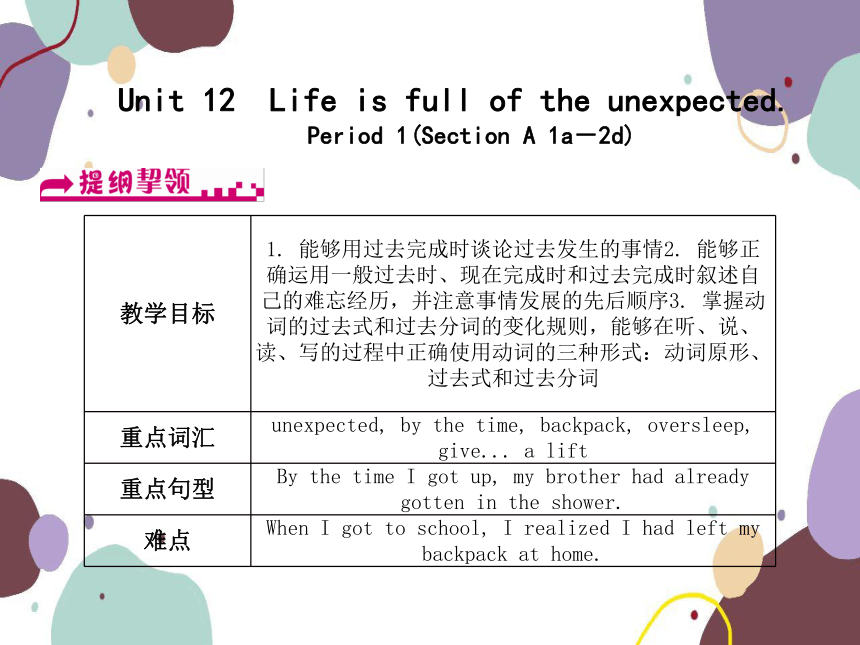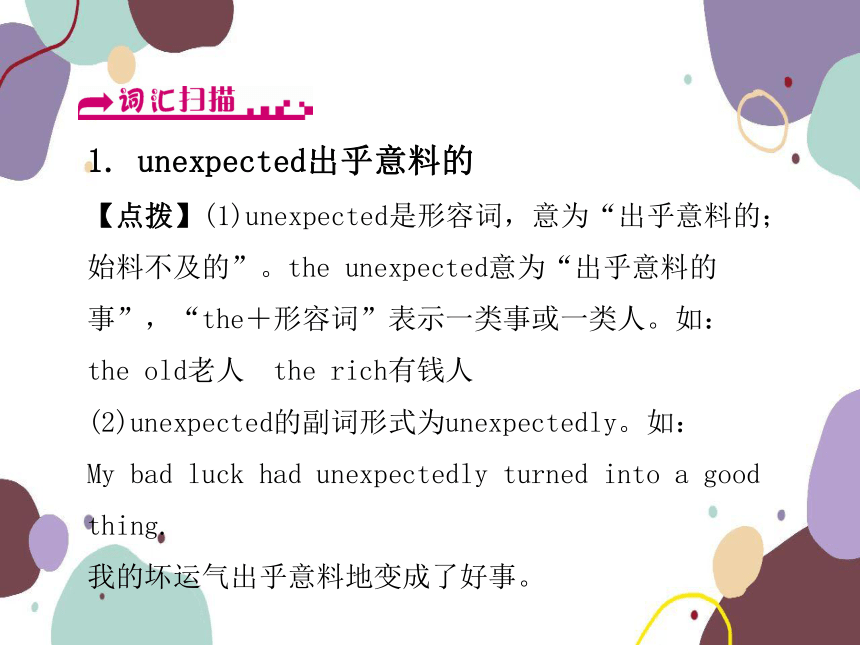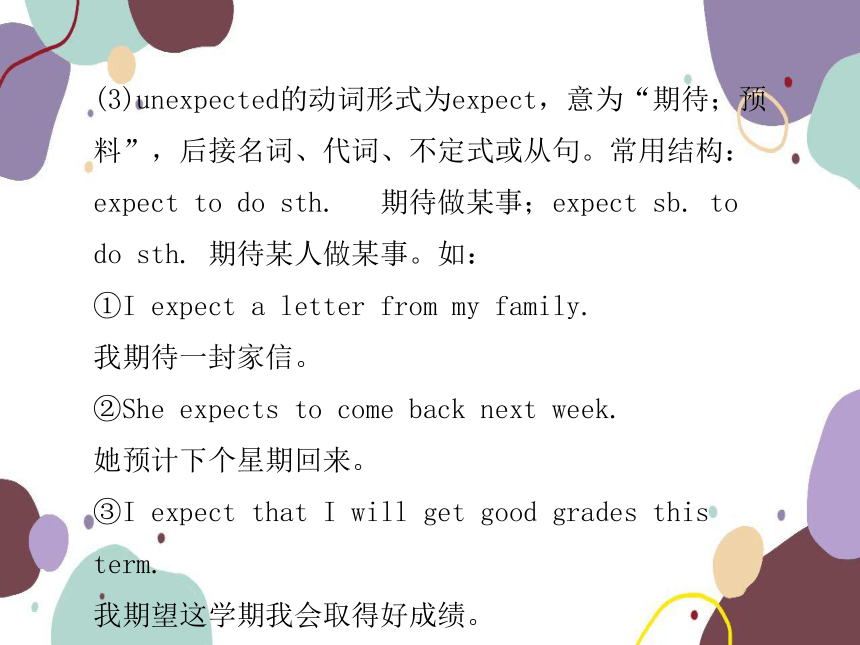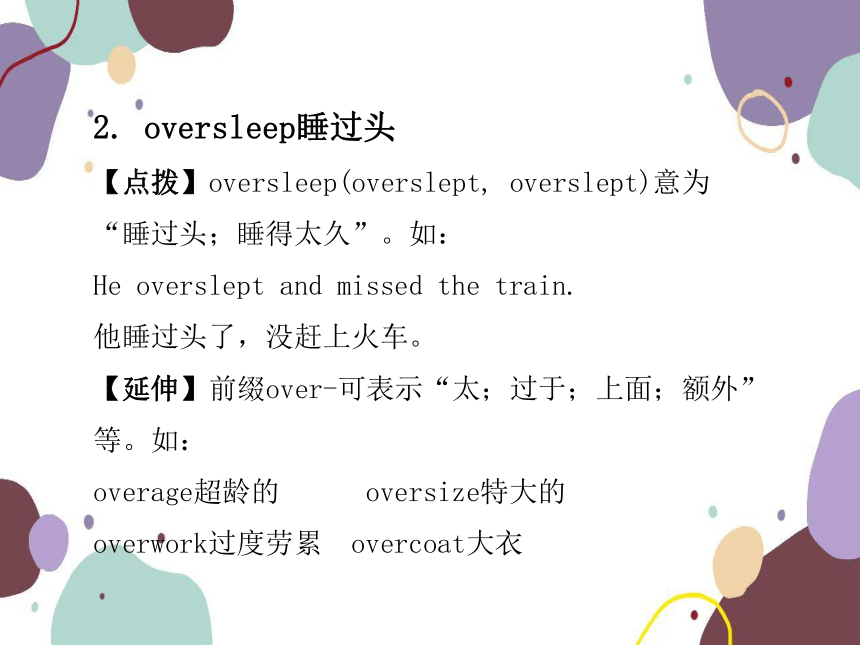人教版九年级全册Unit 12Life is full of the unexpected.Period 1(Section A 1a-2d)单词讲解课件(共9张PPT)
文档属性
| 名称 | 人教版九年级全册Unit 12Life is full of the unexpected.Period 1(Section A 1a-2d)单词讲解课件(共9张PPT) |

|
|
| 格式 | pptx | ||
| 文件大小 | 210.7KB | ||
| 资源类型 | 教案 | ||
| 版本资源 | 人教新目标(Go for it)版 | ||
| 科目 | 英语 | ||
| 更新时间 | 2022-10-25 13:19:34 | ||
图片预览




文档简介
(共9张PPT)
Unit 12 Life is full of the unexpected.
Period 1(Section A 1a-2d)
教学目标 1. 能够用过去完成时谈论过去发生的事情2. 能够正确运用一般过去时、现在完成时和过去完成时叙述自己的难忘经历,并注意事情发展的先后顺序3. 掌握动词的过去式和过去分词的变化规则,能够在听、说、读、写的过程中正确使用动词的三种形式:动词原形、过去式和过去分词
重点词汇 unexpected, by the time, backpack, oversleep, give... a lift
重点句型 By the time I got up, my brother had already gotten in the shower.
难点 When I got to school, I realized I had left my backpack at home.
1. unexpected出乎意料的
【点拨】(1)unexpected是形容词,意为“出乎意料的;始料不及的”。the unexpected意为“出乎意料的事”,“the+形容词”表示一类事或一类人。如:
the old老人 the rich有钱人
(2)unexpected的副词形式为unexpectedly。如:
My bad luck had unexpectedly turned into a good thing.
我的坏运气出乎意料地变成了好事。
(3)unexpected的动词形式为expect,意为“期待;预料”,后接名词、代词、不定式或从句。常用结构:expect to do sth. 期待做某事;expect sb. to do sth. 期待某人做某事。如:
①I expect a letter from my family.
我期待一封家信。
②She expects to come back next week.
她预计下个星期回来。
③I expect that I will get good grades this term.
我期望这学期我会取得好成绩。
2. oversleep睡过头
【点拨】oversleep(overslept, overslept)意为“睡过头;睡得太久”。如:
He overslept and missed the train.
他睡过头了,没赶上火车。
【延伸】前缀over-可表示“太;过于;上面;额外”等。如:
overage超龄的 oversize特大的
overwork过度劳累 overcoat大衣
3. give sb. a lift捎(某人)一程
【点拨】give sb. a lift相当于give sb. a ride,意为“让某人搭便车”。如:
①Luckily, Carl's dad saw me on the street and gave me a lift in his car.
幸运的是,卡尔的爸爸在街上看到了我,捎了我一程。
②Could you give me a lift, please
请问你能否捎我一程?
③He often gives me a lift to the station.
他常让我搭便车去车站。
【延伸】give sb. a lift中的lift为名词,lift还可作动词,意为“举起;消散”。如:
①One finger can't lift a small stone.
一根手指举不起一块小石头(团结就是力量)。
②The mist began to lift.
雾开始消散。
4. be full of 充满;装满
【点拨】be full of 意为“充满;装满”,相当于be filled with,但前者着重于状态,后者侧重于动作。如:
①Our life is full of happiness.
我们的生活充满了幸福。
②The bottle is full of water.
瓶子里装满了水。
③The basket is filled with apples by the old man.老人在篮子里装满了苹果。
By the time I got up, my brother had already gotten in the shower.
我起床时,我哥哥已经在洗澡了。
【点拨】(1)by the time意为“到……时为止;在……以前”,引导时间状语从句,主句常用过去完成时。过去完成时表示“过去的过去”。此处表示get in the shower这个动作发生在get up这个动作之前。
如:
By the time I came in, Tom had written his name on the blackboard.
我进来时,汤姆已经把他的名字写在黑板上了。
(2)若by the time后的从句表示将来发生的事情,则主句谓语动词用将来完成时态。如:
By the time they get there, we'll have finished the work.
他们到达那里时,我们应该已经完成这项工作了。
Unit 12 Life is full of the unexpected.
Period 1(Section A 1a-2d)
教学目标 1. 能够用过去完成时谈论过去发生的事情2. 能够正确运用一般过去时、现在完成时和过去完成时叙述自己的难忘经历,并注意事情发展的先后顺序3. 掌握动词的过去式和过去分词的变化规则,能够在听、说、读、写的过程中正确使用动词的三种形式:动词原形、过去式和过去分词
重点词汇 unexpected, by the time, backpack, oversleep, give... a lift
重点句型 By the time I got up, my brother had already gotten in the shower.
难点 When I got to school, I realized I had left my backpack at home.
1. unexpected出乎意料的
【点拨】(1)unexpected是形容词,意为“出乎意料的;始料不及的”。the unexpected意为“出乎意料的事”,“the+形容词”表示一类事或一类人。如:
the old老人 the rich有钱人
(2)unexpected的副词形式为unexpectedly。如:
My bad luck had unexpectedly turned into a good thing.
我的坏运气出乎意料地变成了好事。
(3)unexpected的动词形式为expect,意为“期待;预料”,后接名词、代词、不定式或从句。常用结构:expect to do sth. 期待做某事;expect sb. to do sth. 期待某人做某事。如:
①I expect a letter from my family.
我期待一封家信。
②She expects to come back next week.
她预计下个星期回来。
③I expect that I will get good grades this term.
我期望这学期我会取得好成绩。
2. oversleep睡过头
【点拨】oversleep(overslept, overslept)意为“睡过头;睡得太久”。如:
He overslept and missed the train.
他睡过头了,没赶上火车。
【延伸】前缀over-可表示“太;过于;上面;额外”等。如:
overage超龄的 oversize特大的
overwork过度劳累 overcoat大衣
3. give sb. a lift捎(某人)一程
【点拨】give sb. a lift相当于give sb. a ride,意为“让某人搭便车”。如:
①Luckily, Carl's dad saw me on the street and gave me a lift in his car.
幸运的是,卡尔的爸爸在街上看到了我,捎了我一程。
②Could you give me a lift, please
请问你能否捎我一程?
③He often gives me a lift to the station.
他常让我搭便车去车站。
【延伸】give sb. a lift中的lift为名词,lift还可作动词,意为“举起;消散”。如:
①One finger can't lift a small stone.
一根手指举不起一块小石头(团结就是力量)。
②The mist began to lift.
雾开始消散。
4. be full of 充满;装满
【点拨】be full of 意为“充满;装满”,相当于be filled with,但前者着重于状态,后者侧重于动作。如:
①Our life is full of happiness.
我们的生活充满了幸福。
②The bottle is full of water.
瓶子里装满了水。
③The basket is filled with apples by the old man.老人在篮子里装满了苹果。
By the time I got up, my brother had already gotten in the shower.
我起床时,我哥哥已经在洗澡了。
【点拨】(1)by the time意为“到……时为止;在……以前”,引导时间状语从句,主句常用过去完成时。过去完成时表示“过去的过去”。此处表示get in the shower这个动作发生在get up这个动作之前。
如:
By the time I came in, Tom had written his name on the blackboard.
我进来时,汤姆已经把他的名字写在黑板上了。
(2)若by the time后的从句表示将来发生的事情,则主句谓语动词用将来完成时态。如:
By the time they get there, we'll have finished the work.
他们到达那里时,我们应该已经完成这项工作了。
同课章节目录
- Unit 1 How can we become good learners.
- Section A
- Section B
- Unit 2 I think that mooncakes are delicious!
- Section A
- Section B
- Unit 3 Could you please tell me where the restroom
- Section A
- Section B
- Unit 4 I used to be afraid of the dark.
- Section A
- Section B
- Unit 5 What are the shirts made of?
- Section A
- Section B
- Review of Units 1-5
- Unit 6 When was it invented?
- Section A
- Section B
- Unit 7 Teenagers should be allowed to choose their
- Section A
- Section B
- Unit 8 It must belong to Carla.
- Section A
- Section B
- Unit 9 I like music that I can dance to.
- Section A
- Section B
- Unit 10 You're supposed to shake hands.
- Section A
- Section B
- Review of Units 6-10
- Unit 11 Sad movies make me cry.
- Section A
- Section B
- Unit 12 Life is full of the unexpected
- Section A
- Section B
- Unit 13 We're trying to save the earth!
- Section A
- Section B
- Unit 14 I remember meeting all of you in Grade 7.
- Section A
- Section B
- Review of Units 11-14
